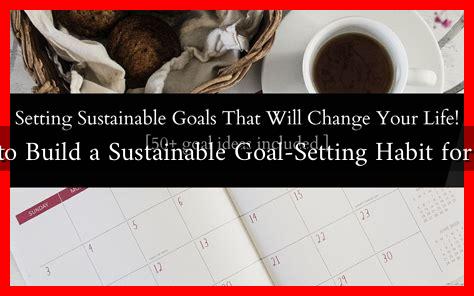-
Table of Contents
How to Build a Sustainable Goal-Setting Habit for 2025
As we approach 2025, the importance of setting sustainable goals has never been more critical. With the rapid changes in our world, from climate change to technological advancements, establishing a framework for effective goal-setting can help individuals and organizations navigate these challenges. This article will explore how to build a sustainable goal-setting habit that not only fosters personal growth but also contributes positively to the community and environment.
The Importance of Sustainable Goal-Setting
Sustainable goal-setting is about creating objectives that are not only achievable but also considerate of long-term impacts. According to a study by the American Psychological Association, individuals who set specific and challenging goals are more likely to achieve them. However, the sustainability aspect ensures that these goals do not compromise future generations or the environment.
Steps to Build a Sustainable Goal-Setting Habit
Building a sustainable goal-setting habit involves a series of strategic steps. Here’s how you can create a framework that works for you:
- Reflect on Your Values: Start by identifying what matters most to you. Consider your personal values, passions, and the impact you want to have on the world.
- Set SMART Goals: Ensure your goals are Specific, Measurable, Achievable, Relevant, and Time-bound. This framework helps clarify your objectives and makes them more attainable.
- Incorporate Sustainability: Align your goals with sustainable practices. For instance, if your goal is to improve your health, consider how your dietary choices can also benefit the environment.
- Break Down Goals: Divide larger goals into smaller, manageable tasks. This approach not only makes the process less overwhelming but also allows for regular progress checks.
- Track Your Progress: Use tools like journals, apps, or spreadsheets to monitor your achievements. Regularly reviewing your progress can help you stay motivated and make necessary adjustments.
- Stay Flexible: Life is unpredictable. Be prepared to adapt your goals as circumstances change. Flexibility is key to maintaining a sustainable goal-setting habit.
Examples of Sustainable Goals
To illustrate the concept of sustainable goal-setting, here are some examples:
- Personal Development: Instead of aiming to read 50 books in a year, set a goal to read one book per month that focuses on sustainability or social justice.
- Environmental Impact: Commit to reducing your carbon footprint by using public transportation or biking at least three times a week.
- Community Engagement: Volunteer for a local organization once a month, focusing on initiatives that promote sustainability and community well-being.
Case Studies: Successful Sustainable Goal-Setting
Several organizations have successfully implemented sustainable goal-setting practices:
- Patagonia: This outdoor clothing brand has integrated sustainability into its business model by setting goals to reduce waste and promote fair labor practices. Their commitment to environmental responsibility has resonated with consumers, leading to increased brand loyalty.
- Unilever: The multinational consumer goods company has set ambitious sustainability goals, including reducing its environmental footprint and improving health and well-being for more than a billion people by 2025. Their Sustainable Living Plan has been a significant driver of growth.
Statistics Supporting Sustainable Goal-Setting
Research shows that sustainable goal-setting can lead to significant benefits:
- A study by the Global Reporting Initiative found that companies with sustainability goals outperform their peers by 5-10% in terms of financial performance.
- According to a report by the World Economic Forum, organizations that prioritize sustainability are more likely to attract and retain top talent.
Conclusion
Building a sustainable goal-setting habit for 2025 is not just about personal achievement; it’s about creating a positive impact on the world around us. By reflecting on your values, setting SMART goals, and incorporating sustainability into your objectives, you can foster a habit that benefits both you and the planet. Remember, the journey of a thousand miles begins with a single step. Start small, stay flexible, and watch as your sustainable goals lead to meaningful change.
For more insights on sustainable practices, consider visiting the United Nations Sustainable Development Goals website.

